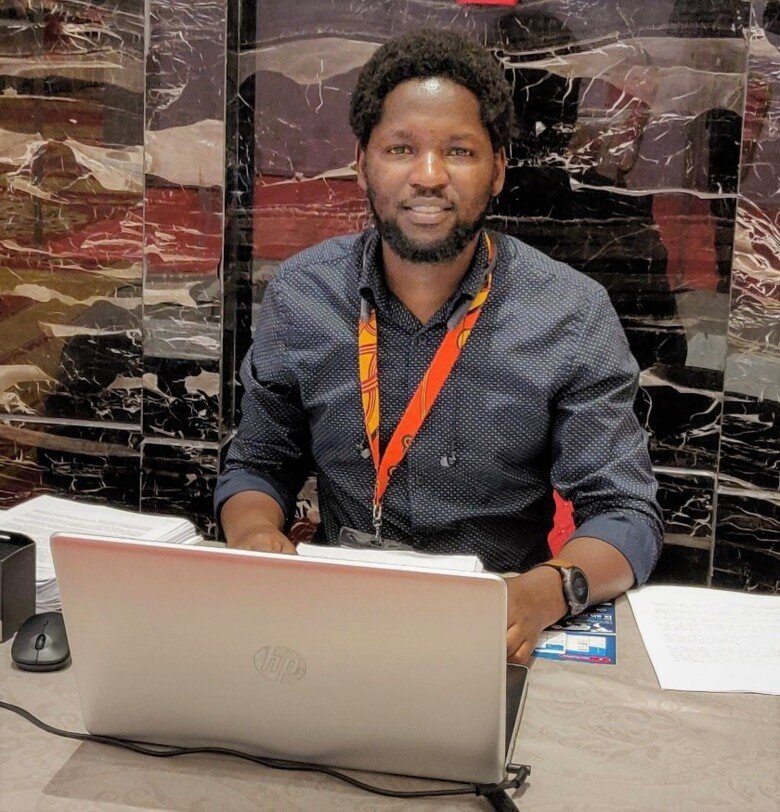Health Informatics alumnus Johnblack tackles health challenges with IT solutions
Name: Johnblack K. Kabukye
Degree: Master's in Health Informatics
Graduation year: 2016

Tell us your story!
I was a medical officer at the Uganda Cancer Institute (UCI) prior to joining KI, but wanted to expand my knowledge to better approach the health problems I was addressing in my work. I was very particular on the area of research I wanted: digital health in cancer care in low resource settings such as at the UCI. This was the motivation for my Master's in the first place (just like I wrote in the motivation letter when applying to KI!). I even did my Master's thesis on this this topic i.e. on electronic medical records for oncology in lower middle income countries.
I automatically returned to my job at the UCI after my Master's degree. However, with the new set of skills and knowledge in health informatics, I chose to divide my time between clinical work and informatics research.
Additionally, after my Master's I felt I needed to immerse myself farther into health informatics. I concluded that the best way was to undertake a PhD. This is because at my workplace, there were not any informaticians who would mentor me. The PhD also allows me to spend more time learning and doing research in informatics.
Finding a PhD position was a bit tricky! Since I wanted to continue in the same research field, I thus had to apply for many PhD positions and approached many different potential PhD supervisors. On two occasions, I was asked if I would be willing to work on another project dealing with a different area of research. I stubbornly insisted on my area of interest. So I was not taken in, likely because most PhD positions are for pre-determined research projects with funding that is directed in a particular topic.
Luckily, the UCI got funding from the African Development Bank as part of a project to turn the UCI into the East African Oncology Institute and Center of Excellence, and capacity building was one of the action areas. Through this, I got funding to begin my PhD and conduct research in an area that I am interested in, but also one that directly benefits the UCI. All I needed was a supervisor willing and able to supervise me. Even that wasn’t simple.
But during my thesis term, I met a fellow Health Informatics alumnus who mentioned that he knew of several professors at the Academic Medical Center in Amsterdam who could potentially be interested in supervising me. Through this network, I arrived to projects in Uganda and a research position in Amsterdam.
Describe the work you do in your current roles
I moved back and forth between Kampala and Amsterdam. At the UCI in Kampala, I saw patients 2 days per week, and worked on informatics tasks and my PhD research the other 3 days. My informatics work mostly took the form of change management and project management for development/procurement, implementation and evaluation of electronic medical records and other health IT systems at the UCI. I spent a lot of time in meetings with stakeholder especially patients, and also discussing with doctors, nurses and other clinicians who are the target end users of the informatics systems.
I was working on a telehealth research project in which we were using smartphone-based colposcopes for cervical cancer screening in rural Uganda. The system allows collection of clinical information and capturing of cervical images on the mobile phone, and these are transmitted to expert gynecologists at the UCI for teleconsultation. The project was initially funded by SPIDER (Swedish program for ICT in Developing Regions) at Stockholm University, but we have gotten more funding from Makerere University to extend it by developing artificial intelligence to automatically classify the cervical images so that we can augment the gynecologist. I was also working on another project in which we were automating delivery of cancer awareness information via basic phone using interactive voice response (IVR) system so as to address the challenges of lack of access to accurate information, low reading literacy and limited number of health educators.
When I was in Amsterdam, I took PhD courses and worked on my research with my supervisors. Thankfully, through teleconferences and other online collaborative spaces, I could continue with grant writing and collaborating on other health IT projects based in Uganda and other low resource settings.
What is your advice to students
Study, but also have fun and network! Your next job position might come from the connections you make while at KI. And don’t give up on your dreams!
